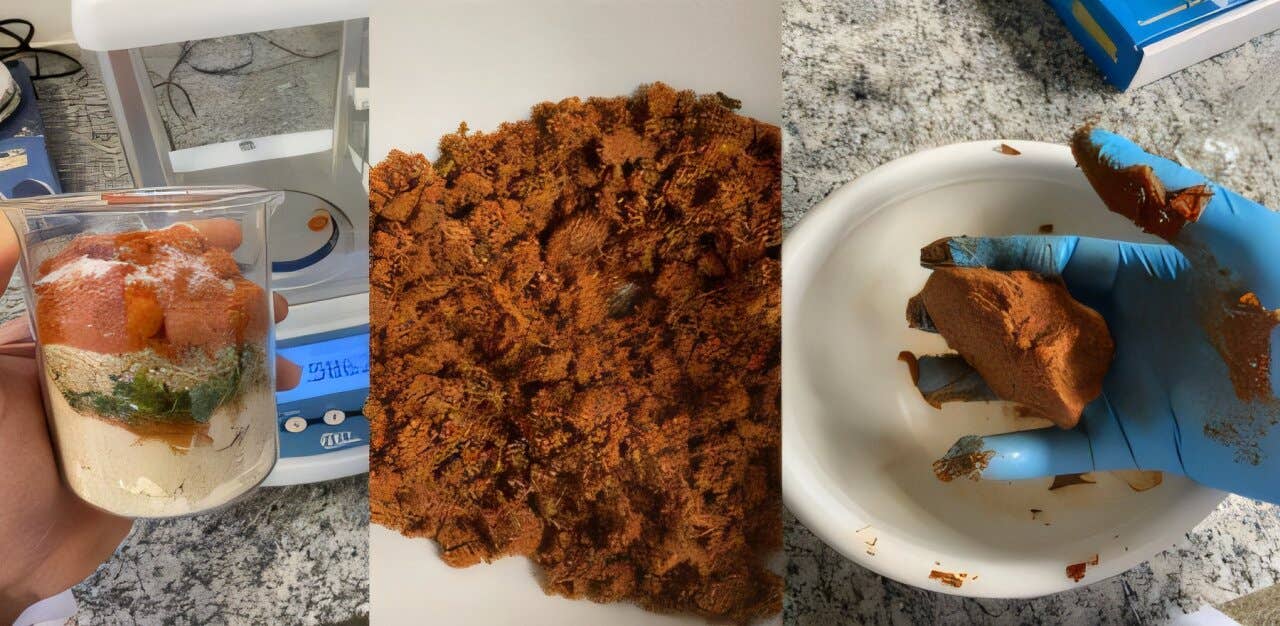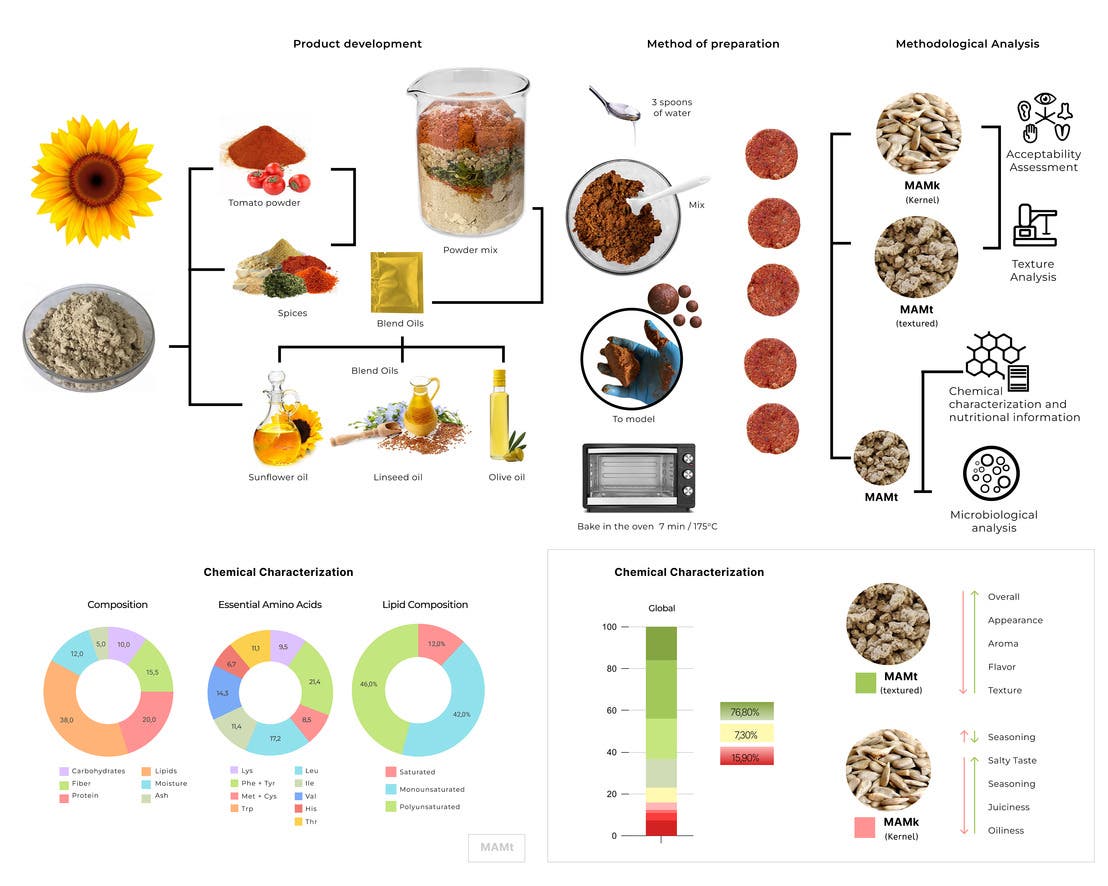From thebrighterside.news
While more and more people turn to plant food, a team of scientists might have found a new meat substitute—in a crop you know. Sunflower, usually grown for its seeds and oil, is now being used to cook a nutritious as well as tasty meat substitute.
Scientists turn sunflower meal into a healthy, sustainable meat substitute packed with protein and minerals. (CREDIT: Yumba)
By transforming sunflower meal, a waste product of oil production, into a plant protein, German and Brazilian researchers are revolutionizing the way we think about food waste, sustainability, and nutrition.
A New Purpose for a Well-Known Crop
Sunflower oil is already a household name, particularly in Europe. But what becomes of the remaining sunflower seed meal after the oil has been removed? Typically, it's discarded or fed to livestock. Researchers chose to investigate its viability for use by humans.
Sunflower meal comes from the oil-extracted seeds that are crushed. However, it does not become safe to eat or pleasant until the meal is cleaned through a process. Husks and portions of plant material called phenolics are removed. Phenolic materials colour the flour darker and harder to digest for the body. Once these are filtered out, the rest of the flour smells and tastes much milder.
In the opinion of Maria Teresa Bertoldo Pacheco, food scientist at Brazil's Institute of Food Technology (ITAL), that neutrality sets sunflower protein apart from other plant-based proteins. "It should also be added that, after husk and phenolic compound removal, the flour has a very neutral flavour and odour, particularly when compared to the different vegetable proteins available," Pacheco said.
Producing a Meat Substitute from Sunflower Meal
After they cleaned and prepared the sunflower meal, the group prepared two different meat substitute mixtures. The first was prepared with flour from roasted sunflower seeds. The second used a textured version of sunflower protein, which gives the final product a more solid bite. Both mixes were then mixed with tomato powder, spices, and a blend of healthy oils—such as sunflower, olive, and linseed oils.
The blend was formed into small patties and cooked to produce mini-burgers. These were put through a series of tests. Flavour testers graded the flavour, smell, texture, and overall enjoyment. The textured protein version emerged victorious, especially for texture. It more closely matched the mouthfeel of meat foods.
The chemistry of the patties showed that they were not only tasty—They were healthy too. The textured mix had about 20% protein and 38% fat, which was mainly a combination of heart-friendly monounsaturated fatty acids. The healthy fats made up almost 42% of the fat.
In addition to that, the patties contained important nutrients. Large amounts of iron, zinc, magnesium, and manganese were included. In fact, a serving supplied 49% of the daily value for iron, 68% for zinc, 95% for magnesium, and 89% for manganese. This mineral burst is especially useful in plant-based eating plans, which tend to lack these items.
More Than Just Protein
Protein isn't just about quantity—it's also about quality. The sunflower-based burger contained all the necessary amino acids. Those are the blocks your body needs but can't produce for itself. The only partially limiting amino acid was lysine, and that still scored 0.8. That's nearly the threshold of complete proteins.
Pacheco noted that this profile also justifies the use of sunflower flour as a meat substitute. "The product has a good balance of essential amino acids," she said. "This is another reason it could make its way onto the food market as a meat product substitute from a nutritional standpoint."
While the burger mixture isn't there yet to provide the taste of meat, the study has vast potential. Other processing technologies, including extrusion, can help to develop a meat-like texture and fibrous structure. "From a functional-technological point of view, processes that build fibrous proteins, such as extrusion, are needed to give a product a more meat-like appearance and sensation," Pacheco said.
A Growing Field in More Ways Than One
There is a reason that the scientists chose to study sunflower meal today. Sunflower oil is a massive commodity in Europe, and sunflower crops are increasing in Brazil. The more fields that cultivate the crop, the more sunflower meal will be created. That gives a massive amount of plant material that isn't genetically modified and ready for use.
As environmental issues and climate change dictate the manner in which humans are consuming, the demand for sustainable and green food is increasing. Taking a ubiquitous farm by-product and turning it into a delicious, protein-rich meat substitute that checks many boxes: less food waste, smaller water footprint than raising animals, and less greenhouse gas emissions.
The study was supported by FAPESP, Brazil's largest science funding agency. Pacheco attributed international collaboration to keeping the research alive. The exchange with the German scientists did not stop at exchanging techniques—it went so far as to involve student exchange and knowledge acquisition. "I think the research provided a good amount of positive references, both to make full use of the cultivar and to encourage consumption and appreciation of the flour," stated Pacheco.
The Future of Sunflower Protein
It is just the start, but here is hope. With further development, sunflower meal could play a large role in the food system of the future. Not only is it a nutritional giant, but it is also an option within a tidal wave of plant-based proteins.
Most importantly, it solves two gigantic problems at once—how to feed a growing population and how to feed them without destroying the planet. These kinds of foods could be the keys to a more sustainable and balanced diet.
As the science continues to unfold, expect to see more of these kinds of foods in the markets.
Research was conducted in collaboration between Brazil's Institute of Food Technology (ITAL) and the University of Campinas (UNICAMP) and researchers at Germany's Fraunhofer IVV Institute.
Research findings are available online in the journal Food Research International.



No comments:
Post a Comment